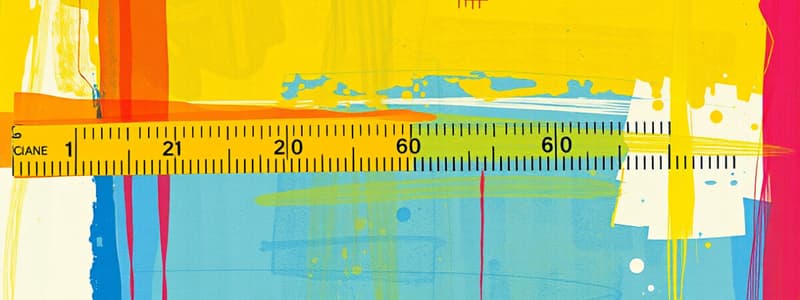Podcast
Questions and Answers
What is reliability?
What is reliability?
The extent to which measurement is consistent and free from error.
What is the observed score a function of?
What is the observed score a function of?
True score plus/minus error component.
What are the types of measurement error?
What are the types of measurement error?
- Systematic Error
- Random Error
- Both A and B (correct)
- None of the above
What is systematic error?
What is systematic error?
What is random error?
What is random error?
What are the three sources of measurement error?
What are the three sources of measurement error?
What does regression to the mean refer to?
What does regression to the mean refer to?
What is the conceptual definition of reliability?
What is the conceptual definition of reliability?
What is a variance?
What is a variance?
What is the general reliability ratio (coefficient)?
What is the general reliability ratio (coefficient)?
What does correlation measure?
What does correlation measure?
What are the types of reliability testing?
What are the types of reliability testing?
What is test-retest reliability?
What is test-retest reliability?
What is the test-retest reliability coefficient?
What is the test-retest reliability coefficient?
What is the assumption of rater reliability?
What is the assumption of rater reliability?
What is intra-rater reliability?
What is intra-rater reliability?
What are the two concerns for intra-rater reliability?
What are the two concerns for intra-rater reliability?
What are the two measures of reliability that are essentially the same in test-retest situations where rater skill is relevant?
What are the two measures of reliability that are essentially the same in test-retest situations where rater skill is relevant?
What does inter-rater reliability concern?
What does inter-rater reliability concern?
Which should be determined first: inter-rater or intra-rater reliability?
Which should be determined first: inter-rater or intra-rater reliability?
What is alternate-forms reliability testing?
What is alternate-forms reliability testing?
What does internal consistency reliability testing reflect?
What does internal consistency reliability testing reflect?
What statistical analysis is used for internal consistency?
What statistical analysis is used for internal consistency?
What is the minimum detectable change?
What is the minimum detectable change?
Flashcards are hidden until you start studying
Study Notes
Reliability of Measurement
- Reliability refers to the consistency of a measurement and its freedom from error, conceptualized as reproducibility and yielding stable responses under identical conditions.
Observed Score
- Observed score consists of a true score plus or minus an error component. True scores are estimated since they cannot be directly calculated.
Types of Measurement Error
- Two main types of measurement errors exist: systematic error and random error.
Systematic Error
- Systematic errors are predictable and constant, negatively impacting validity but not statistically affecting reliability. An example is a consistently miscalibrated tape measure.
Random Error
- Random errors are unpredictable and attributed to chance, diminishing reliability as they decrease. Factors like fatigue during measurements can introduce random errors.
Sources of Measurement Error
- Measurement errors can arise from three sources: the individual taking the measurement, the measuring instrument, and the variability of the characteristic being measured.
Regression to the Mean
- Extreme scores trend toward the average upon retesting, reflecting a statistical phenomenon known as regression to the mean.
Concept of Reliability
- Reliability can be defined as the degree to which a score is devoid of error.
Variance and Reliability
- Variance measures the dispersion of scores in a sample, with greater variance indicating larger score differences.
General Reliability Ratio
- The general reliability ratio is calculated as true score variance divided by the sum of true score variance and error variance, ranging from 0.00 (no reliability) to 1.00 (perfect reliability).
Correlation Defined
- Correlation indicates the degree of association between two data sets but does not assess agreement extent.
Types of Reliability Testing
- Various forms of reliability testing include test-retest, rater reliability (both inter-rater and intra-rater), alternate forms, and internal consistency.
Test-Retest Reliability
- Test-retest reliability evaluates an instrument's ability to consistently measure a variable. A single sample is measured at least twice under similar conditions, with reliable scores expected to be similar.
Test-Retest Reliability Coefficient
- The intraclass correlation coefficient (ICC) is used as the test-retest reliability coefficient on a scale of 1.0. For nominal data, Percent Agreement or Kappa statistic may be applied.
Rater Reliability
- Rater reliability presumes stability in instrument and response variables, allowing score differences to be attributed to rater error, categorized into intra-rater and inter-rater reliability.
Intra-Rater Reliability
- Intra-rater reliability assesses the consistency of recordings by a single person across multiple assessments, ideally utilizing three or more recordings for best results.
Concerns for Intra-Rater Reliability
- Two key concerns include carryover/practice effects and rater bias; blinding and reliance on objective data can mitigate these issues.
Link Between Intra-Rater and Test-Retest Reliability
- In a test-retest context where rater skill is involved, intra-rater reliability is effectively equivalent to test-retest reliability.
Inter-Rater Reliability
- Inter-rater reliability examines the variation in measurements made by multiple raters for the same characteristic, which impacts external validity. It is best assessed when all raters perform independent evaluations of identical trials simultaneously.
Determining Rater Reliability
- Intra-rater reliability should be established prior to inter-rater reliability.
Alternate-Forms Reliability Testing
- This approach assesses the equivalence of multiple versions of an instrument by administering both versions to the same group within one session and correlating outcomes.
Internal Consistency Reliability Testing
- Internal consistency evaluates how well items on a scale measure distinct aspects of a singular characteristic, typically assessed through correlations among scale items.
Statistical Analysis for Internal Consistency
- Common statistical evaluations for internal consistency include Cronbach's Alpha and item-to-total correlation.
Minimum Detectable Change
- Refers to the smallest amount of change in a variable that must be achieved for it to be considered meaningful.
Studying That Suits You
Use AI to generate personalized quizzes and flashcards to suit your learning preferences.




